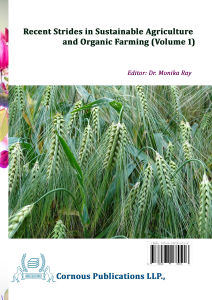The chapter explores into the fundamental concepts that define organic agriculture. Organic farming is driven by health, ecological and ethical values aimed at promoting sustainability, biodiversity, and soil health. Essential to organic farming are the principles of natural input use, crop rotation, and composting, which aim to reduce dependance on synthetic chemicals while enhancing soil fertility. The chapter highlights how organic farming practices prioritize ecosystem equilibrium, nurturing the relationship between plants, animals, and the environment. Key principles discussed include soil management through organic matter enrichment, pest control through biological methods and water conservation. Moreover, the importance of genetic diversity and the use of locally adapted seeds are underscored to support flexibility against climate change. The chapter also emphasizes the ethical considerations in organic farming, focusing on social justice, animal welfare and fair labor practices. With the growing global demand for sustainable food systems, the chapter delivers understandings into how organic farming aligns with environmental stewardship and consumer health; while addressing challenges such as yield efficiency and market accessibility. The general approach in organic farming contributes to long-term agricultural sustainability and food security.
organic farming, sustainability, soil health, biodiversity, food security
Davis, A. S., & Hill, J. E. (2019). Organic farming: A holistic approach to sustainable agriculture. Sustainable Agriculture Reviews, 33, 1-25.
Gomiero, T., Pimentel, D., & Paoletti, M. G. (2011). Environmental impact of different agricultural management practices: conventional vs. organic agriculture. Critical reviews in plant sciences, 30(1-2), 95-124.
Llewellyn, R., & Ouzman, J. (2020). Conservation agriculture in Australia: 30 years on. Australian agriculture in, 21-33.
Reganold, J. P., & Wachter, J. M. (2016). Organic agriculture in the twenty-first century. Nature plants, 2(2), 1-8.
Schonbeck, M., & Stein, M. (2017). Reducing Risk through Best Soil Health Management Practices in Organic Crop Production.
Sharma, V., Irmak, S., & Padhi, J. (2018). Effects of cover crops on soil quality: Part II. Soil exchangeable bases (potassium, magnesium, sodium, and calcium), cation exchange capacity, and soil micronutrients (zinc, manganese, iron, copper, and boron). Journal of Soil and Water Conservation, 73(6), 652-668.
